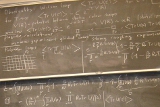TALENT / INT Course on Nuclear Forces
Links
These pointers to supplementary information will be regularly updated.
Contents
- Nuclear physics resources --- preprints, NN data and phase shifts, ...
- Relevant INT programs and workshops, both on-going or up-coming and past.
- Talks at recent nuclear physics conferences
- Computational resources
Nuclear physics resources
- arXiv:nucl-th --- archive of preprints devoted to nuclear theory.
- arXiv:nucl-ex --- archive of preprints devoted to nuclear experiment.
- NN-OnLine --- database of NN scattering observables and phase shift analysis (plus codes!)
- Center for Nuclear Studies (CNS) Data Analysis Center (DAC) --- data bases for NN observables and partial-wave analysis plus much more.
Relevant INT programs and workshops
-
Advances in Quantum Monte Carlo Techniques for Non-Relativistic Many-Body Systems (INT-13-2a)
June 24 - August 2, 2013
F. Pederiva, F. Arias de Saavedra, J. Drut, J. DuBois, S. Gandolfi -
Nuclei and Fundamental Symmetries: Theory Needs of Next-Decade Experiments (INT-13-2b)
August 5 - August 30, 2013
D. Gazit, W. Haxton, A. Schwenk, N. Tolich -
Universality in Few-Body Systems: Theoretical Challenges and New Directions (INT-14-1)
March 10 - May 16, 2014
D. Blume, F. Ferlaino, C. Greene, H-W. Hammer, D. Phillips, S. Tan
Selected past programs/workshops
- INT-13-1a: Computational and Theoretical Advances for Exotic Isotopes in the Medium Mass Region, March 25 - April 19, 2013 [online talks]
- INT-13-52W: Nuclear Structure and Dynamics at Short Distances, February 11 - 22, 2013 [online talks]
- INT-13-53W: Nuclear Reactions from Lattice QCD, March 11-12, 2013 [online talks]
- INT-12-2a: Core-Collapse Supernovae: Models and Observable Signals, June 25 - July 27, 2012 [online talks]
- INT-12-3: Light Nuclei from First Principles, September 17 - November 16, 2012 [online talks]
- INT-11-1: Fermions from Cold Atoms to Neutron Stars: Benchmarking the Many-Body Problem, March 14-May 20, 2011 [online talks]
- INT-11-2a: Extreme Computing and its Implications for the Nuclear Physics/Applied Mathematics/Computer Science Interface, June 6-July 8, 2011 [online talks]
- INT-11-2b: Astrophysical Transients: Multi-messenger Probes of Nuclear Physics, July 11 - August 5, 2011 [online talks]
- INT-11-2d: Interfaces between structure and reactions for rare isotopes and nuclear astrophysics), August 8 - September 2, 2011 [online talks]
- INT-11-48W: 7th ANL/INT/JINA/MSU annual FRIB workshop, August 8 - 12, 2011 [online talks]
- INT-10-1: Simulations and Symmetries: Cold Atoms, QCD, and Few-hadron Systems, March 15 - May 21, 2010 [online talks]
- INT-10-45W: New Applications of the Renormalization Group Method in Nuclear,
Particle and Condensed Matter Physics, February 22-26, 2010 [online talks] - INT-10-46W: Weakly-Bound Systems in Atomic and Nuclear Physics, March 8 - 12, 2010 [online talks]
- 6th ANL/MSU/JINA/INT FRIB Theory Workshop
Computational Forefront in Nuclear Theory: Preparing for FRIB, March 23 - 26, 2010 [online talks] - INT-09-1: Effective Field Theories and the Many-Body Problem, March 23 - June 5, 2009 [online talks and FAQ (which needs updating!)]
Talks at recent nuclear physics conferences
- From Few-Nucleon Forces to Many-Nucleon Structure, 10-14 June 2013, ECT* Trento, Italy
- International Conference on Nuclear Theory in the Supercomputing Era - 2013, Monday, May 13 - Friday, May 17, 2013 ~ Ames, Iowa
- Progress in Ab Initio Techniques in Nuclear Physics, February 21-23, 2013, TRIUMF, Vancouver, BC, Canada
- The Extreme Matter Physics of Nuclei: From Universal Properties to Neutron-Rich Extremes, April 16 to May 11, 2012, GSI, Darmstadt, Germany
Computational resources
- Mathematica
- Getting a 30-day trial version of Mathematica. You can download a copy of Mathematica
that is almost completely functional (some Import and Export functionality is disabled),
which will work at no cost for a month. You can get a version for Windows,
Macintosh, or Linux. Here's what to do:
- Go here and fill in the box that says "How do you plan to use Mathematica during your trial?" with something like "To do calculations and run demonstration notebooks at a nuclear physics summer school." Press the "Continue" button.
- Fill in: first name, last name, email address, password, confirm password, address, city, zip/postal, country, state (if applicable). Choose "student" for "Which best describes you?". Press the "Submit" button.
- You will get a unique download link emailed to the address entered in the last part (and another email with an activation key). Go to this email, follow the link, and sign in with the email address and password you entered. Pick your computer type and start the download. It is a big file (about 1.3 GB), so this may take a while if you don't have a fast connection.
- Start up the downloaded file and step through the install. The defaults should be fine if you have enough disk space (it needs 4-5GB). When complete, start up Mathematica and put in the activation key that was emailed to you. Accept the terms and you are ready to go!
- Here is a sample notebook to try (you may have to save it first, then double-click on it to start up Mathematica or open it from within Mathematica).
- Getting a 30-day trial version of Mathematica. You can download a copy of Mathematica
that is almost completely functional (some Import and Export functionality is disabled),
which will work at no cost for a month. You can get a version for Windows,
Macintosh, or Linux. Here's what to do:
- Python
- Enthought Canopy Python distribution. Everything you need: SciPy, NumPy, Matplotlib, and more. Click on "Get Canopy" and download the free version. For a more complete package, get a (free) Academic License before downloading.
- A Survey of Computational Physics by Rubin Landau, Manual Paez, and Cristian Bordeianu is a free eTextBook using Python. Here is a local copy.


